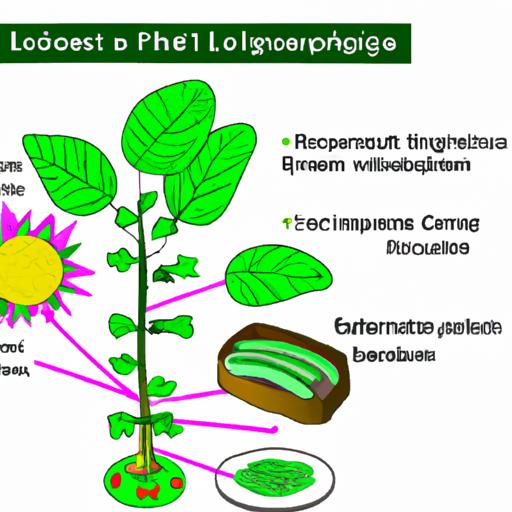Plants have always fascinated us with their ability to grow, thrive, and provide us with sustenance. As we delve deeper into the world of plant cell biology, we often encounter questions about whether plants possess certain cellular structures that are commonly found in animal cells. One such query that piques our curiosity is, “do plants have lysosomes?” To answer this intriguing question, let’s embark on a journey through the cellular world and uncover the truth behind lysosomes in plant cells.
The Importance of Lysosomes in Cells
Before we delve into the presence of lysosomes in plants, let’s understand the significance of these tiny organelles in cellular function. Lysosomes are membrane-bound structures that act as the “recycling centers” of animal cells. They contain various enzymes responsible for breaking down and recycling cellular waste, damaged organelles, and foreign substances. Essentially, lysosomes play a crucial role in maintaining cellular health, as they aid in digestion, waste removal, and the regulation of cellular processes.
Introducing the Question: Do Plants Have Lysosomes?
Now that we comprehend the importance of lysosomes, let’s turn our attention to the fascinating world of plant cell biology. While lysosomes are commonly found in animal cells, the presence of similar structures in plant cells has long been a subject of scientific inquiry. As we explore this topic further, we’ll seek to unravel whether plants possess lysosomes or if they have adapted alternative structures to perform similar functions.
In the upcoming sections, we’ll delve into the intricacies of lysosomes in both animal and plant cells, examining their roles and functions. We’ll then compare and contrast the presence of lysosomes in animal cells with the structures found within plant cells. By the end, we’ll have a clearer understanding of whether plants indeed have lysosomes or if their cellular machinery operates differently to achieve similar outcomes.
Join me on this captivating exploration of plant cell biology, as we unlock the mysteries surrounding lysosomes and gain a deeper appreciation for the remarkable intricacies of the natural world.
Stay tuned for Section II, where we’ll delve deeper into our understanding of lysosomes in animal cells and their vital functions.
Understanding Lysosomes
What Are Lysosomes and Their Role in Cellular Function?
To comprehend the presence of lysosomes in plant cells, we must first grasp the essence of these remarkable organelles. Lysosomes are small, spherical vesicles enclosed by a single membrane, and they are primarily found in animal cells. These structures contain a variety of hydrolytic enzymes, such as proteases, lipases, and nucleases, which are capable of breaking down various substances.
The Versatile Functions of Lysosomes in Animal Cells
Lysosomes are known for their versatility in fulfilling critical roles within animal cells. These dynamic organelles are responsible for an array of functions:
-
Cellular Digestion: Lysosomes aid in the digestion of macromolecules, such as proteins, carbohydrates, and lipids. They break down these complex molecules into simpler forms that can be utilized by the cell for energy production and other vital processes.
-
Waste Removal: Lysosomes serve as the cell’s waste disposal system, eliminating unwanted or damaged cellular components. They engulf and digest cellular debris, worn-out organelles, and foreign substances, ensuring the maintenance of a healthy cellular environment.
-
Cellular Signaling: Lysosomes play a crucial role in cellular signaling pathways. They regulate various processes, such as nutrient sensing, growth, and autophagy, which is the controlled degradation of cellular components to maintain cellular homeostasis.
-
Immune Response: Lysosomes participate in the immune response by aiding in the degradation of pathogens, such as bacteria or viruses, engulfed by the cell. This function helps protect the cell and the organism from potential harm.
By performing these multifunctional tasks, lysosomes contribute significantly to the overall health and proper functioning of animal cells.
Continue reading in Section III, where we’ll explore the presence of lysosomes in plant cells and unravel the truth behind their existence or lack thereof.
Lysosomes in Animal Cells
The Presence of Lysosomes in Animal Cells
When it comes to lysosomes, animal cells are the frontrunners. These tiny organelles are abundantly present within animal cells and play a significant role in various cellular processes. Lysosomes are spherical compartments enclosed by a lipid bilayer, containing a plethora of digestive enzymes known as acid hydrolases. These enzymes are responsible for breaking down various molecules, including proteins, nucleic acids, carbohydrates, and lipids.
The Significance of Lysosomes in Animal Cells
Lysosomes are often referred to as the “cleanup crew” of animal cells, as they actively participate in cellular digestion and waste removal. Their primary function is to break down cellular waste materials and recycle them into reusable components. This process, known as autophagy, helps maintain cellular homeostasis and prevents the accumulation of toxic substances.
Moreover, lysosomes also play a crucial role in phagocytosis, the process by which cells engulf and digest foreign particles or pathogens. They fuse with phagosomes, forming phagolysosomes, where the engulfed materials are broken down and destroyed. This innate immune response helps protect the organism against harmful invaders.
Another vital function of lysosomes is their involvement in programmed cell death, known as apoptosis. Lysosomes release specific enzymes, such as cathepsins, which trigger a cascade of events leading to cell death. This controlled process is essential for eliminating damaged or unnecessary cells during development and maintaining tissue homeostasis.
In summary, lysosomes in animal cells are not only ubiquitous but also indispensable for maintaining cellular health and functionality. Their role in cellular digestion, waste removal, immune defense, and programmed cell death showcases the crucial significance of these organelles in animal cell biology.
Stay tuned for Section IV, where we’ll explore whether plant cells possess structures similar to lysosomes and how they contribute to cellular processes.
Lysosomes in Plant Cells
Exploring the Presence of Lysosomes in Plant Cells
As we navigate the world of plant cell biology, the question of whether plants possess lysosomes arises. While lysosomes are a prominent feature in animal cells, their presence in plant cells has been a topic of scientific debate. Interestingly, recent discoveries have shed light on structures within plant cells that share similarities with lysosomes, albeit with some distinct characteristics.
Do Plants Have Structures Similar to Lysosomes?
While plants may not have conventional lysosomes, they possess organelles that perform analogous functions. One such organelle is the plant vacuole, a large membrane-bound sac that occupies a significant portion of the plant cell’s volume. The plant vacuole acts as a multifunctional organelle, performing tasks comparable to those carried out by lysosomes in animal cells.
Plant Vacuoles: The Versatile Organelles
Plant vacuoles are involved in a wide range of cellular processes, including storage, waste management, and cellular homeostasis. These organelles play a pivotal role in storing essential nutrients, such as water, ions, sugars, and pigments. Additionally, vacuoles aid in maintaining the turgidity and structural integrity of plant cells, contributing to the overall health and vigor of the plant.
Vacuole Functions Resembling Lysosomes
While plant vacuoles do not possess the same enzymatic composition as lysosomes, they display functional similarities. Plant vacuoles participate in the breakdown and recycling of cellular waste, similar to the digestive role played by lysosomes in animal cells. They also contribute to detoxification processes within the plant cell, removing harmful substances and storing them safely within the vacuole.
Conclusion: A Different Approach to Cellular Recycling
In conclusion, while plants may not possess traditional lysosomes, they have adapted alternative structures to fulfill similar functions. Plant vacuoles serve as the plant equivalent of lysosomes, facilitating cellular waste management, storage, and detoxification processes. Through this distinct approach to cellular recycling, plants showcase their remarkable ability to adapt and thrive in diverse environments.
Stay tuned for Section V, where we’ll delve deeper into the functions and comparisons between vacuoles and lysosomes in plant and animal cells.
Section V: Vacuoles: The Plant Equivalent of Lysosomes?
Explaining the Role and Functions of Vacuoles in Plant Cells
In the world of plant cell biology, one structure often considered as the plant equivalent of lysosomes is the vacuole. Vacuoles are large, membrane-bound organelles found in plant cells that serve numerous essential functions. While they may not be exactly the same as lysosomes, vacuoles play a vital role in maintaining cellular homeostasis and carrying out various cellular processes.
Vacuoles serve as storage compartments within plant cells, containing a diverse array of molecules such as water, sugars, ions, pigments, and even toxins. These storage capabilities enable plants to adapt and survive in different environments. Additionally, vacuoles function as structural support, helping to maintain the rigidity and shape of plant cells, especially in non-woody plants.
Comparing the Functions of Vacuoles and Lysosomes in Cellular Processes
While vacuoles and lysosomes have distinct characteristics, they share some commonalities in terms of their functions within cellular processes. One of the primary roles of both vacuoles and lysosomes is to act as a degradative compartment. Lysosomes break down and recycle cellular waste in animal cells, while vacuoles perform similar functions in plant cells. They aid in the breakdown and recycling of macromolecules, such as proteins, nucleic acids, and carbohydrates, thereby maintaining cellular metabolism and nutrient availability.
Moreover, vacuoles and lysosomes play crucial roles in detoxification processes. Lysosomes in animal cells help neutralize harmful substances, while vacuoles in plant cells store toxins, preventing them from causing harm to the rest of the cell. This ability to sequester toxins showcases the adaptability of plant cells in dealing with environmental challenges.
In addition to their degradative and detoxification functions, both vacuoles and lysosomes are involved in maintaining osmotic balance within cells. Vacuoles regulate the water content and ion balance in plant cells, helping to maintain turgor pressure and overall cell stability. Similarly, lysosomes in animal cells participate in regulating the pH and ion concentrations necessary for cellular processes.
While vacuoles and lysosomes have some functional similarities, it is important to note that their structures and specific enzymatic activities differ. Lysosomes contain a wide range of hydrolytic enzymes responsible for cellular digestion, whereas vacuoles primarily store molecules and have more diverse functions beyond degradation.
In conclusion, while vacuoles in plant cells are not exact replicas of lysosomes found in animal cells, they perform analogous functions and contribute to the overall health and functionality of plant cells. Their role in storage, degradation, detoxification, and osmotic regulation showcases the remarkable adaptability of plant cells to thrive in diverse environments.
Next up, in Section VI, we will summarize our findings and reveal the answer to the burning question: “Do plants have lysosomes?”
Conclusion
After a comprehensive exploration of the world of plant cell biology, we have shed light on the intriguing question of whether plants have lysosomes. While lysosomes are well-known for their presence in animal cells and their vital role in cellular digestion and waste removal, the situation is quite different in plant cells.
Plants do not possess lysosomes in the same way that animal cells do. Instead, they have specialized organelles called vacuoles that perform similar functions to lysosomes. Vacuoles act as storage units within plant cells, aiding in the breakdown and recycling of cellular waste, maintaining turgor pressure, and storing essential nutrients, pigments, and defense compounds.
Although not identical in structure or function to lysosomes, vacuoles serve as the plant equivalent, showcasing the remarkable adaptability and diversity of cellular processes in different organisms. It is through these unique adaptations that plants have thrived and evolved to meet their distinct needs in the natural world.
In conclusion, while plants do not possess traditional lysosomes, they have evolved alternative structures, such as vacuoles, to fulfill similar roles. By understanding the nuanced differences in cellular structures between plants and animals, we gain a deeper appreciation for the complexity and diversity of life on our planet.
So, the next time you marvel at the beauty and resilience of plants, remember that their cellular machinery operates in its own extraordinary way, paving the way for their survival and ecological importance.
Thank you for joining me on this enlightening journey through plant cell biology and the fascinating world of lysosomes. Stay curious, keep exploring, and let’s continue unraveling the mysteries of nature together.




